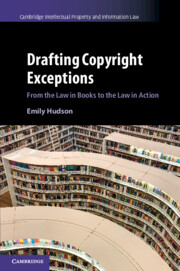Book contents
- Drafting Copyright Exceptions
- Cambridge Intellectual Property and Information Law
- Drafting Copyright Exceptions
- Copyright page
- Dedication
- Contents
- Preface
- Table of Cases
- Table of Statutes
- Part I Background
- Part II The Law in Action
- Part III The Future
- 8 New Norms and Practices
- 9 Drafting Copyright Exceptions
- Appendix Empirical Methodology
- Bibliography
- Index
- Cambridge Intellectual Property and Information Law
8 - New Norms and Practices
from Part III - The Future
Published online by Cambridge University Press: 31 March 2020
- Drafting Copyright Exceptions
- Cambridge Intellectual Property and Information Law
- Drafting Copyright Exceptions
- Copyright page
- Dedication
- Contents
- Preface
- Table of Cases
- Table of Statutes
- Part I Background
- Part II The Law in Action
- Part III The Future
- 8 New Norms and Practices
- 9 Drafting Copyright Exceptions
- Appendix Empirical Methodology
- Bibliography
- Index
- Cambridge Intellectual Property and Information Law
Summary
The previous three chapters focused on reported institutional practices in relation to three standard-like exceptions: fair use in US law; section 200AB in Australian law; and fair dealing in Canada in the five years following CCH Canadian Ltd v. Law Society of Upper Canada. The differences in practices were stark. Despite all three provisions adopting open-ended language, US interviewees reported that fair use was invoked for a range of internal and public-facing uses, whilst Australian interviewees treated section 200AB as an extremely narrow orphaned works provision, and Canadian institutions had not, with one minor exception, shifted their practices in response to CCH. If the narrative stopped there it might leave questions about the fair use panacea, including the capacity of other forms of drafting to capture the benefits of fair use, but also the ability of fair use (or equivalent standards) to flourish outside of US conditions.
- Type
- Chapter
- Information
- Drafting Copyright ExceptionsFrom the Law in Books to the Law in Action, pp. 265 - 307Publisher: Cambridge University PressPrint publication year: 2020

